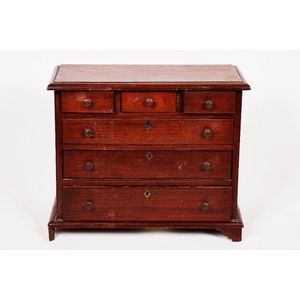Late 19th Century Georgian Style Miniature Chest
You must be a subscriber, and be logged in to view price and dealer details.
Subscribe Now to view actual auction price for this item
When you subscribe, you have the option of setting the currency in which to display prices to $Au, $US, $NZ or Stg.
- A/f, as Inspected - The letters "A/F" or "as inspected" as part of a description is the cataloguer's shorthand for "all faults" or "as found", meaning the item has some type of damage or deficiency, it is of uncertain date or provenance, and/or that the seller takes no responsibility for the completeness of the item or the accuracy of the description.
- Georgian - As an English stylistic period, Georgian is usually taken to cover the period from George I (1714) to the Regency of Prince George (1811-20), although the period from 1800 to 1830 is sometimes designated as the Regency period. During the Georgian period the great English cabinetmakers and designers such as Chippendale, Hepplewhite, Adam Sheraton etc., were all active.
Therefore there isn't a single 'Georgian style' as such and to say something is 'Georgian', usually means it was made between 1714 and 1830. This assumes we discount George V and George VI, both being from the 20th century.
The styles popular at the time of each reign were:
George I (1714-1727) saw out the last years of the Baroque period.
George II (1727-1760) reigned during the Rococo period.
George III (1760-1820) saw the last gasp of the Rococo, all of the early Neo-Classic 'Adam style' and most of the later neo-Classic 'Regency style'.
George IV (Prince Regent 1820-1830)encompassed the last of the 'Regency' style.
William IV's reign (1830-1837) was something of a no man's land (stylistically) and he wasn't a 'George' anyway. He covered the last glimmerings of 'Regency' and the start of the 'Victorian' style.
This item has been included into following indexes:
Visually similar items

A small cedar apprentice chest of draws, Australian, 19 th century;44 cm high, 44 cm wide, 24 cm deep

A Victorian mahogany bow front chest of five drawers raised on bun feet and turned handles. Veneer losses. Height 114 cm. Width 113 cm. Depth 52 cm

An Australian cedar 8 drawer chest with turned columns, Circa 1880. 130 cm high, 125 cm wide, 54 cm deep.

A 19th century Australian full cedar apprentice chest, with seven drawers above turned legs, lacking two drawer knobs, 64 x 65.5 x 25.5 cm
